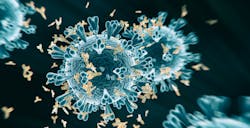Antibody research shows promise in fight against COVID-19
Based on positive results in recent preclinical studies, potently neutralizing antibodies identified by researchers are showing promise as a potential therapy for preventing and treating COVID-19, according to scientists at Vanderbilt University Medical Center (VUMC). The monoclonal antibodies were isolated from the blood of a couple from Wuhan, China, who were diagnosed with COVID-19 after traveling to Toronto, Canada, in late January. They were two of the earliest confirmed cases of COVID-19 in North America.
During the past two years, VUMC researchers led by James Crowe, Jr., MD, and Robert Carnahan, PhD, have developed ultra-fast methods for discovering highly potent antiviral human monoclonal antibodies and validating their ability to protect small animals and non-human primates, all in less than three months.
Reporting in the journal Nature Medicine, the researchers and colleagues from across the country describe how they used this rapid antibody discovery platform to isolate hundreds of human monoclonal antibodies against the surface spike (S) protein that enables SARS-CoV-2, the virus that causes COVID-19, to infect lung cells.
In a separate report published in the journal Nature, VUMC scientists and their colleagues describe how two of the antibodies, COV2-2196 and COV2-2130, bind to distinct sites on the S protein and either alone or in combination reduce the viral “burden” in infected mice and protect them from weight loss and lung inflammation. They also found that COV2-2196 and another potent antibody, COV2-2381, given alone protected rhesus macaques from SARS-CoV-2 infection. Collectively these results suggest that these monoclonal antibodies, either alone or in combination, “are promising candidates for prevention or treatment of COVID-19,” the researchers concluded.
Last month, AstraZeneca licensed one set of the antibodies described in the Nature paper for clinical evaluation and development. IDBiologics, a Nashville, TN-based biotechnology firm, has licensed a separate set of the antibodies. Both companies are planning clinical trials this summer.

